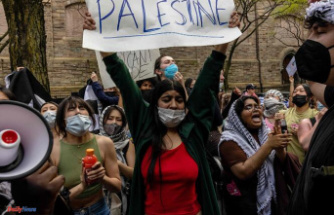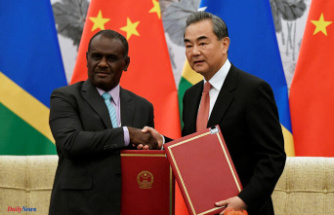Full Palestinian membership in the UN will still have to wait. The United States, which did everything to delay the Security Council vote, did not hesitate to use its right of veto on Thursday April 18 to block the Palestinians' request for integration into the international organization.
For several weeks, the latter - which since 2012 have had the lower status of "non-member observer state" -, as well as the Arab countries, have implored the Council to accept that a "Palestinian state" takes its "legitimate" place in the within the United Nations. In vain.
Washington's position was immediately denounced by the Palestinian Authority. “This aggressive US policy towards Palestine, its people and their legitimate rights represents a blatant assault on international law and encouragement of the continuation of the genocidal war against our people (…) which further pushes the region to the brink of the abyss” , declared the office of its president Mahmoud Abbas, in a press release.
This rejection “will not break our will, will not stop our determination. We will not stop our efforts. The State of Palestine is inevitable, it is real,” said the Palestinian ambassador to the UN, Riyad Mansour, in tears. “Do not forget that when this session is adjourned, innocent people in Palestine will continue to pay with their lives and the lives of their children the price of Israeli actions, (…), the price of delaying justice, of freedom and peace,” he lamented in a speech that provoked tears in the Council chamber.
“Today is a sad day,” said the new Chinese ambassador, Fu Cong, expressing his “disappointment” at the American veto. “The dream of the Palestinian people has been shattered,” he added.
“We will come back, stronger and noisier.”
The admission of a State to the UN must receive a positive recommendation from the Council (at least 9 votes out of 15 in favor, without veto from a permanent member), then be approved by the General Assembly, by a majority of votes. two-thirds. The draft resolution presented by Algeria which recommended Palestinian membership received 12 votes for, one against and two abstentions (United Kingdom and Switzerland).
Despite the American veto, the “overwhelming” support of Council members “sends a very clear message: the State of Palestine deserves its place” at the UN, launched Algerian Ambassador Amar Bendjama, promising on behalf of the Arab group to resubmit this request at a later date. “Yes, we will come back, stronger and noisier,” he said.
The United States has repeatedly repeated in recent weeks that its position "has not changed" since 2011, when the membership request presented by Palestinian Authority President Mahmoud Abbas fell through in the face of American opposition, even before reaching the Council stage.
Washington wants direct negotiations between the parties
“This vote does not reflect opposition to a Palestinian state, but is a recognition that it can only arise from direct negotiations between the parties,” justified the deputy American ambassador, Robert Wood, regretting “premature actions here at New York, even with the best intentions.”
The United States also highlighted American legislation that would require it to cut its funding to the UN in the event of Palestinian membership outside of such a bilateral agreement between Israel and the Palestinians. The last veto of a state's membership in the UN dates back to 1976, when the Americans blocked entry into Vietnam.
The Israelis also virulently denounced the Palestinian initiative, criticizing the simple fact that the Council was examining it. And its rejection did not satisfy them, their ambassador to the UN, Gilad Erdan, denouncing the countries which supported it. “Talking to this Council is like talking to a wall,” he said, believing that these favorable voices would encourage the Palestinians not to return to the negotiating table and “make peace almost impossible.”
The Israeli government opposes the two-state solution, defended by a large majority of the international community, including the United States. The majority of the 193 UN member states (137 according to the Palestinian Authority's count) unilaterally recognize a Palestinian state.












